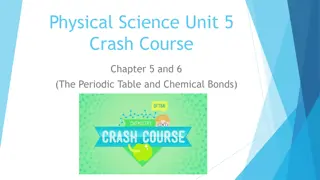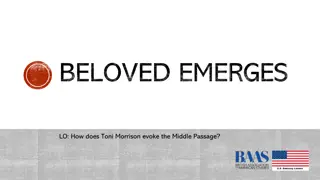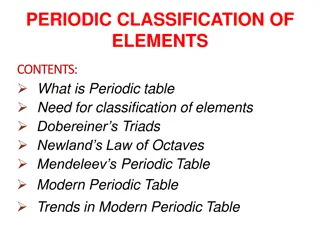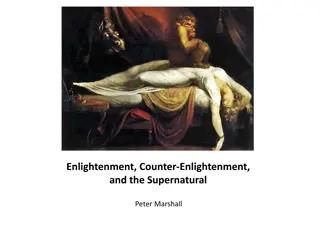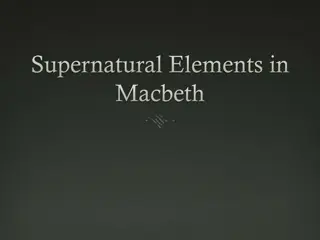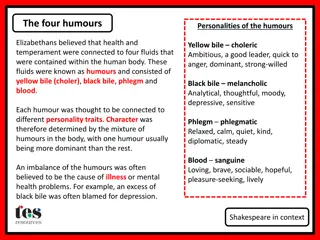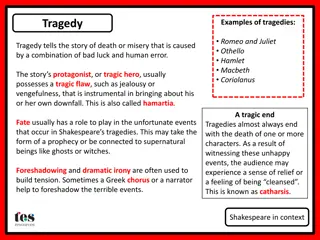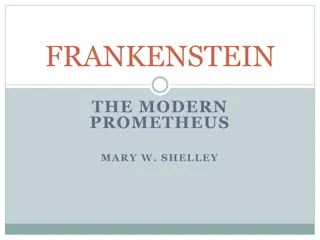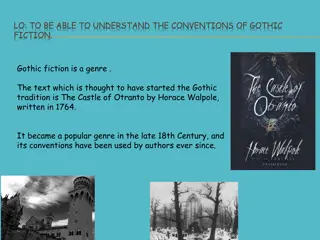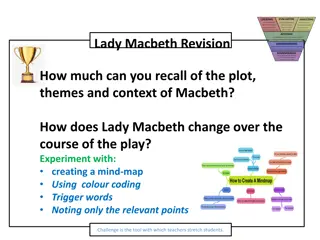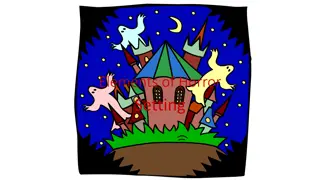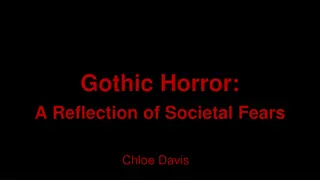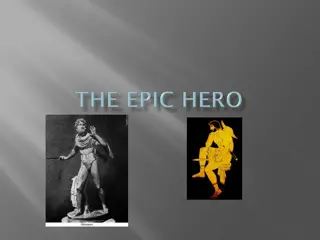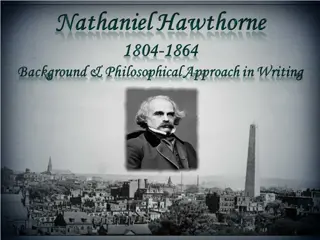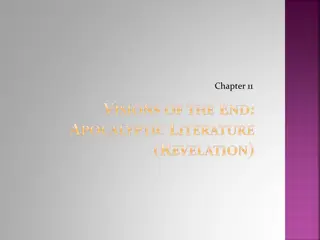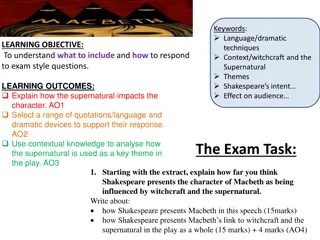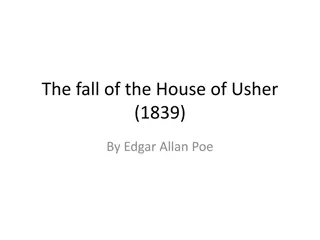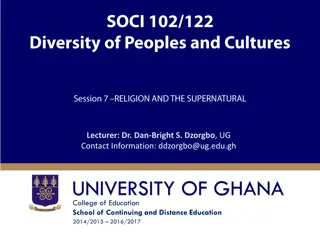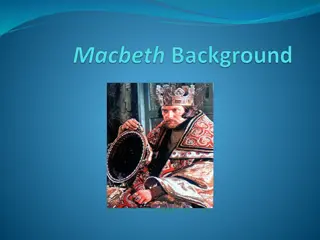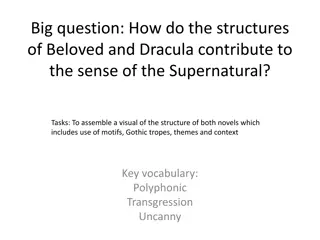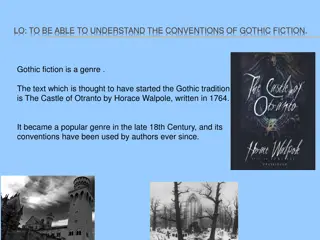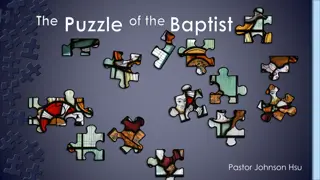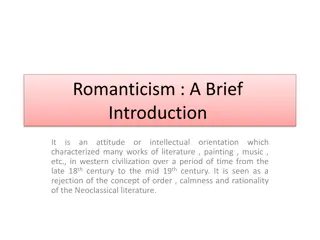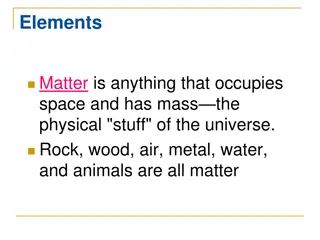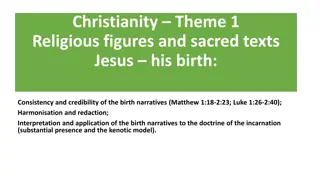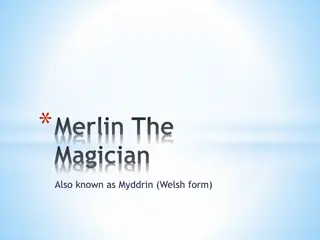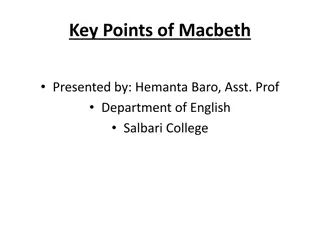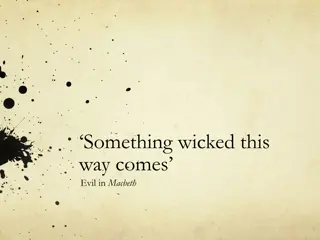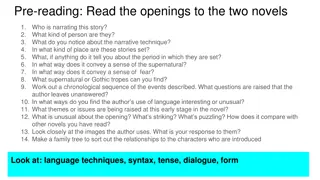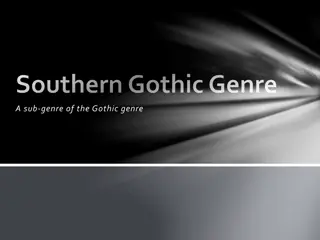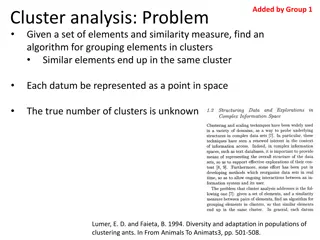Insights into Shakespeare's "Macbeth" and Language Techniques
Explore key themes, characters, language techniques, and historical context in William Shakespeare's "Macbeth." Dive into the tragic hero Macbeth's evolution from protagonist to antagonist, Lady Macbeth's manipulative nature, and the supernatural elements portrayed by the witches. Understand the sig
6 views • 76 slides
The Periodic Table and Chemical Bonds in Physical Science
The periodic table organizes elements based on their properties, with rows representing periods and columns representing groups. Mendeleev's early table laid the foundation for predicting undiscovered elements. Today's periodic table orders elements by atomic number, showcasing the periodic law and
3 views • 15 slides
Examining Water Imagery in Toni Morrison's "Beloved" and Its Contextualization with Historical Events
Toni Morrison skillfully evokes the harrowing Middle Passage experience in "Beloved" through water imagery, symbolizing themes of cleansing, rebirth, and trauma. By comparing the water symbolism at various points in the novel, readers can explore its significance in relation to historical events lik
6 views • 14 slides
Analyzing Neil Gaiman's Writing in "Click Clack the Rattle Bag
Exploring Neil Gaiman's short story "Click Clack the Rattle Bag" in the gothic genre. The story is described as spooky with a mix of dark and funny elements. Readers delve into the unexpected ending and sinister undertones, making it ideal for fans of horror and supernatural themes. The narrative sk
0 views • 29 slides
Evolution of Periodic Table and Classification of Elements
The Periodic Table is a systematic arrangement of elements based on atomic number and properties. Over time, chemists developed various classification methods such as Dobereiner's Triads, Newland's Law of Octaves, Mendeleev's Periodic Table, and the Modern Periodic Table to organize the increasing n
1 views • 26 slides
Enlightenment, Counter-Enlightenment, and the Supernatural
The relationship between religion and the Enlightenment was characterized by a shift towards viewing them as non-antagonistic entities, despite some lingering conflicts. While the Enlightenment aimed to combat religious bigotry and superstition, it did not eradicate supernatural beliefs entirely, le
0 views • 8 slides
Supernatural Elements in Macbeth: Witches, Dagger, Ghost
The supernatural plays a crucial role in Shakespeare's "Macbeth," providing intrigue, insight into characters, and enhancing pivotal scenes. From the mysterious witches to the eerie floating dagger and haunting ghost of Banquo, these supernatural elements add depth and complexity to the storyline, r
0 views • 13 slides
Beliefs and Influences in Elizabethan Era
Elizabethans believed in the connection between health, temperament, and the four humours - yellow bile, black bile, phlegm, and blood - each associated with specific personality traits. They also linked star signs to body parts and embraced the divine order of the chain of being, respecting the hie
0 views • 6 slides
Shakespearean Drama Overview
Tragedies in Shakespeare's works often depict the protagonist's downfall due to a tragic flaw, intertwined with fate and supernatural elements leading to death or misery. Comedies, on the other hand, explore themes of love and humor, usually culminating in marriage and a sense of hope. Tragicomedies
1 views • 5 slides
Analysis of Romantic and Gothic Elements in Frankenstein by Mary Shelley
This analysis explores the parallels between Mary Shelley's Frankenstein and Romantic and Gothic literary elements, delving into themes of creation, hubris, nature, and the supernatural. The narrative revolves around Victor Frankenstein's pursuit of creating life, intertwined with Romantic ideals an
1 views • 11 slides
D-Block Elements: Properties and Classification in Chemistry
Welcome to the Department of Chemistry at Kisan Veer Mahavidyalaya, Wai. Explore the Chemistry of Elements of the 3d series, focusing on d-Block Elements and Transition Elements. Learn about their electronic structure, colored ions, magnetic properties, oxidation states, and complex formation. Under
0 views • 34 slides
Unlocking Success Through Kingdom Stewardship
Discover the essential elements for a successful life and learn how to apply them effectively to achieve guaranteed results. Explore the avenues for Kingdom stewardship including intercession, soul winning, financial commitment, and physical service. Unveil the rewards of stewardship such as divine
0 views • 4 slides
Gothic Literature Features and Analysis for Exam Preparation
Explore the key features of Gothic literature, including elements like supernatural imagery, isolation, and extreme emotions. Dive into quick questions and extended response tasks to deepen understanding. Get insights on relevant vocabulary and how to analyze extracts effectively for exams.
1 views • 58 slides
Gothic Fiction Conventions
Explore the origins and key features of Gothic fiction, including dark settings, supernatural elements, and eerie atmospheres. Analyze gothic story openings and extract examples from works like Frankenstein to understand gothic features and emotional impact.
0 views • 25 slides
Lady Macbeth - Key Themes, Plot, and Context Exploration
This content delves into the plot, themes, and context of Macbeth while focusing on Lady Macbeth's transformation throughout the play. It includes key elements such as the supernatural, the role of women, and the impact of witchcraft beliefs in Shakespeare's era.
0 views • 18 slides
Elements of Horror Setting: Castles, Lighting, and Victorian Novels
Explore the eerie elements of horror settings such as deserted castles, spooky lighting, and classic Victorian horror novels. Delve into the dark secrets, supernatural occurrences, and terrifying events that define the genre.
0 views • 8 slides
Analysis of 'The Black Cat' by Edgar Allan Poe
The narrator in "The Black Cat" by Edgar Allan Poe introduces a chilling tale, setting the stage with details from his past. His childhood love of animals contrasts with his darkening mood and violent actions as an adult, particularly towards his beloved pet cat, Pluto. The story foreshadows horrors
0 views • 36 slides
Gothic Horror: A Reflection of Societal Fears and Its Influence in Young Adult Literature
Gothic horror, as reflected in media creations like Dracula and Twilight, serves as a mirror to societal fears. Through themes of darkness, supernatural elements, and exploring anxieties, the genre provides a safe space for societal introspection. This content delves into how Gothic horror motifs in
0 views • 10 slides
The Modern Epic Hero: Unveiling the Heroic Journey in Contemporary Narratives
In classical times, epic poems depicted heroic figures embarking on grand adventures that revealed the fears and desires of their culture. These heroes possessed admirable qualities and often faced supernatural challenges, reflecting the values of their society. Today, modern-day epics continue this
0 views • 10 slides
Nathaniel Hawthorne: Life, Background, and Influence on Romanticism
Nathaniel Hawthorne, born in Salem to a Puritan background, faced family history shadows and solitude. Despite an initial setback with his writing, he emerged as a prominent figure in American Romanticism. With a unique style, Hawthorne contributed to the literary movement focusing on past settings
0 views • 10 slides
Apocalyptic Literature in Revelation
Explore the fascinating genre of apocalyptic literature through an in-depth study of the Book of Revelation. Delve into the historical background, interpretative approaches, and essential elements of this profound genre that envisions the end times. Discover how apocalypticism merges earthly circums
0 views • 39 slides
Shakespeare's Portrayal of Macbeth's Interaction with Witchcraft and the Supernatural
Shakespeare explores Macbeth's deepening connection to witchcraft and the supernatural through a compelling dramatic monologue where Macbeth grapples with a hallucination of a dagger. This extract delves into Macbeth's internal turmoil, hinting at the influence of supernatural forces on his actions
0 views • 22 slides
Semantic Data Model of Electronic Invoicing Core Elements
Presentation by Fred van Blommestein on the EN16931-1 semantic data model of core elements in electronic invoicing, covering invoice processes, core invoice design, semantic model details, business rules, and invoicing principles. The model includes 160 elements in 33 groups, with mandatory elements
0 views • 13 slides
Gothic Literature and Edgar Allan Poe: A Deep Dive into the Dark and Mysterious
Delve into the world of Gothic literature through the works of Edgar Allan Poe, a master of the genre. Explore the eerie settings, melodramatic narratives, and sense of fear and dread that define Gothic literature. Discover Poe's life story, his struggles, and his enigmatic persona that still intrig
0 views • 31 slides
Religion and the Supernatural in Society
This session introduces the concept of religion and its connection to the supernatural, exploring various definitions, sociological and anthropological perspectives, theories, and functions of religion. The session aims to enhance understanding of religious diversity and the significance of supernat
0 views • 10 slides
History and Supernatural Intrigues Surrounding Macbeth and King James I
Macbeth, written around 1606 to honor King James I's ascension, drew inspiration from Scottish history and set in 11th century Scotland. King James I's rule in Scotland and England, marriage to Anne of Denmark, and encounters with the supernatural, including witchcraft accusations, are intriguing fa
0 views • 21 slides
Analyzing Supernatural Elements in the Structures of Beloved and Dracula
Explore the influence of structure on the supernatural in Beloved and Dracula through motifs, Gothic tropes, themes, and context. Understand the concepts of polyphonic, transgression, and the uncanny in relation to the novels, while considering elements like multiple voices, shifting identities, and
0 views • 12 slides
Gothic Fiction Conventions in Literature
Gothic fiction is a captivating genre rooted in dark, mysterious settings, supernatural elements, and eerie atmospheres. Originating with "The Castle of Otranto" by Horace Walpole, this genre has evolved to encompass elements like family curses, isolated castles, and sinister creatures. Dive into th
0 views • 25 slides
Reflections on Biblical Prophets and Silence Through the Ages
Exploring the intriguing stories of biblical prophets like John the Baptist and the prophecy of silence in the book of Amos. Delve into the significance of figures like Malachi, the last Jewish prophet according to Jewish tradition, and ponder over the 400 years of prophetic silence leading up to Je
0 views • 16 slides
Romanticism: A Brief Introduction to Literary Movement
Romanticism, a significant literary movement from the late 18th to mid-19th century, emphasized individuality, subjectivity, emotion, and the supernatural. It marked a departure from Neoclassical ideals of order and rationality. Key characteristics include subjectivity, spontaneity, love of the supe
0 views • 8 slides
Exploring the World of Matter and Elements
Matter is the physical "stuff" of the universe, encompassing elements that make up rocks, wood, air, metals, water, and living organisms. Chemical elements are the building blocks of matter, with essential elements like oxygen, carbon, hydrogen, and nitrogen constituting a significant part of living
0 views • 24 slides
Comparing the Birth Narratives of Jesus in Matthew and Luke
Explore the consistency and credibility of the birth narratives of Jesus as presented in the Gospels of Matthew and Luke. Dive into the themes of incarnation, substantial presence, and the kenotic model as applied to these accounts. Discover the main characters, supernatural elements, titles attribu
0 views • 17 slides
The Legend of Merlin: Greatest Wizard and Prophet
Merlin the Magician, also known as Myddrin, is a legendary figure considered the greatest wizard and prophet of all time. Born of a virgin nun and a supernatural monk, he possessed immortal qualities but also mortal feelings and failings. Merlin played a crucial role as the architect of Camelot, cre
0 views • 6 slides
S-Block Elements in the Periodic Table
The s-block elements in the Periodic Table consist of 14 elements with unique properties and characteristics. Lithium, sodium, and potassium are notable members of Group 1, characterized by their reactivity and ability to form alkaline solutions when in contact with water. These soft metals exhibit
0 views • 23 slides
Key Points of Macbeth by Hemanta Baro
This presentation on the tragedy of Macbeth by William Shakespeare delves into key aspects such as major conflicts, the theme of good versus evil, the concept of kingship, the role of the supernatural elements, and an analysis of Macbeth's character transformation. It explores the struggle within Ma
0 views • 9 slides
Aerobic Gymnastics Competition Guidelines and Rules
The guidelines for aerobic gymnastics competitions include compulsory elements, categories, competition spaces, deductions, and specific rules for different age groups. The competitions have specific parameters for elements allowed, lifting, floor elements, music length, maximum difficulty elements,
1 views • 17 slides
Evil in Shakespeare's Macbeth: A Deep Dive
Delve into the depths of evil in Shakespeare's Macbeth as critics analyze the play's exploration of the nature of evil. From supernatural elements to tragic consequences, the discussion uncovers the complexity and darkness that pervades the characters and themes of Macbeth. Discover how the play's p
0 views • 26 slides
Comparative Analysis of Gothic Novels: Dracula and Unnamed Story
The provided texts delve into the openings of two different Gothic novels, exploring narrators, settings, supernatural elements, and narrative techniques. Readers are encouraged to analyze the themes, characters, and use of language by the authors in the early stages of the stories. Epigraphs from t
0 views • 13 slides
Southern Gothic Genre, Magical Realism, and Their Characteristics
Southern Gothic Genre is a sub-genre of the Gothic genre characterized by settings in the South, eccentric flawed characters, grotesque activities, irony, and social commentary. Magic Realism combines realistic events with surreal elements, portraying world views through others' eyes and experiences
0 views • 4 slides
Cluster Analysis: Grouping Elements into Clusters with Similarity Measures
Given a set of elements and a similarity measure, the algorithm aims to group elements into clusters where similar elements are grouped together. Each element is represented as a point in space, and the true number of clusters is unknown. The clustering algorithm is inspired by the behavior of ants
0 views • 15 slides

